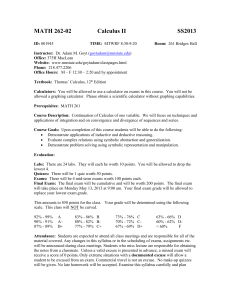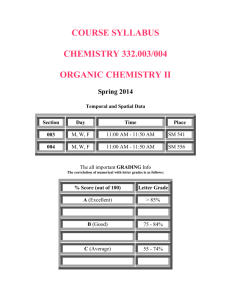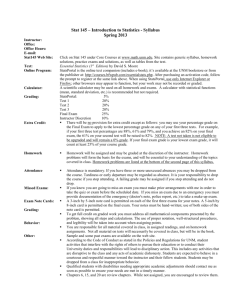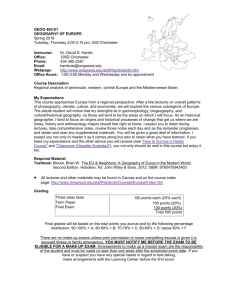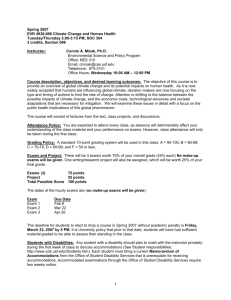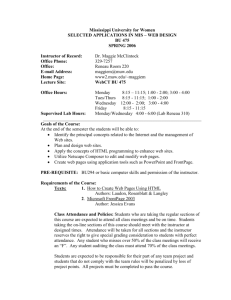SOCIOLOGICAL ANALYSIS OF SOCIAL PROBLEMS Sociology 01
advertisement
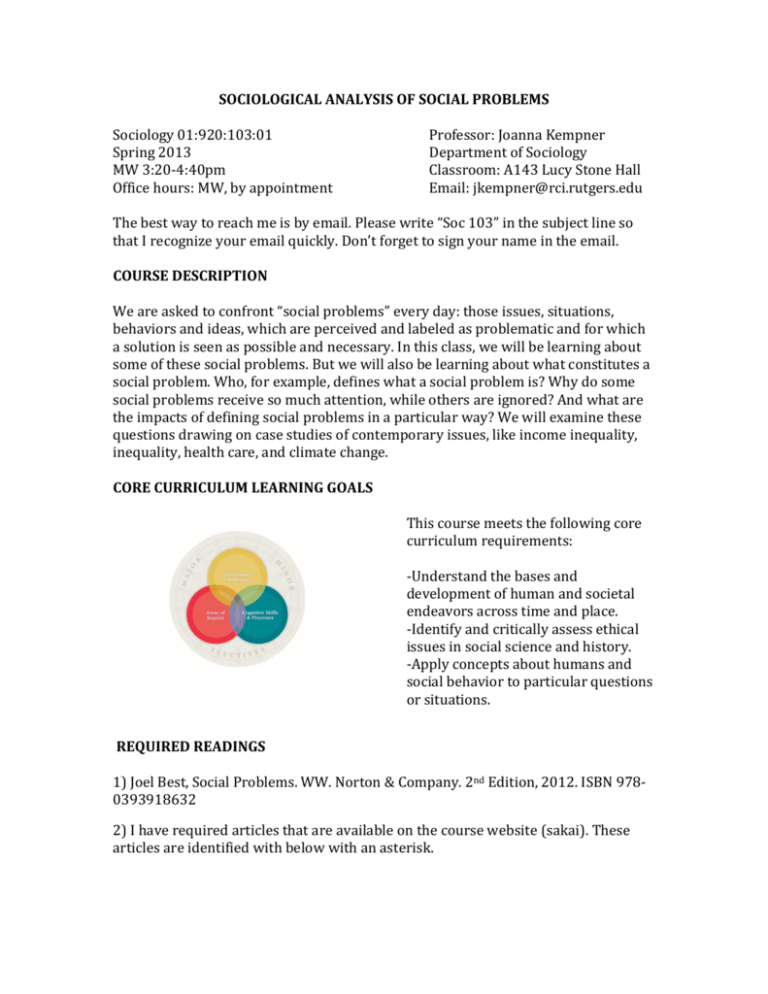
SOCIOLOGICAL ANALYSIS OF SOCIAL PROBLEMS Sociology 01:920:103:01 Professor: Joanna Kempner Spring 2013 Department of Sociology MW 3:20-­‐4:40pm Classroom: A143 Lucy Stone Hall Office hours: MW, by appointment Email: jkempner@rci.rutgers.edu The best way to reach me is by email. Please write “Soc 103” in the subject line so that I recognize your email quickly. Don’t forget to sign your name in the email. COURSE DESCRIPTION We are asked to confront “social problems” every day: those issues, situations, behaviors and ideas, which are perceived and labeled as problematic and for which a solution is seen as possible and necessary. In this class, we will be learning about some of these social problems. But we will also be learning about what constitutes a social problem. Who, for example, defines what a social problem is? Why do some social problems receive so much attention, while others are ignored? And what are the impacts of defining social problems in a particular way? We will examine these questions drawing on case studies of contemporary issues, like income inequality, inequality, health care, and climate change. CORE CURRICULUM LEARNING GOALS This course meets the following core curriculum requirements: -­‐Understand the bases and development of human and societal endeavors across time and place. -­‐Identify and critically assess ethical issues in social science and history. -­‐Apply concepts about humans and social behavior to particular questions or situations. REQUIRED READINGS 1) Joel Best, Social Problems. WW. Norton & Company. 2nd Edition, 2012. ISBN 978-­‐
0393918632 2) I have required articles that are available on the course website (sakai). These articles are identified with below with an asterisk. Textbook is available at the Rutgers University Bookstore and on reserve at Mabel Smith Douglass Library. COURSE REQUIREMENTS LECTURES & READINGS The course is organized around readings, lectures, films, and current event presentations. Lecture time is used to clarify the reading material, to present additional material related to the readings, screen films, and hold in-­‐class exercises. Lectures are designed to explain and complement the reading materials, but you will be tested on reading material even if we do not cover it in class. Assigned material must be read prior to class. It is highly unlikely that you can pass the course without attending lectures. Powerpoint presentations will be posted to the course website, but these will only provide an outline of the day’s lecture. If you do miss a lecture, please ask a classmate for notes. This is a large class and I will be lecturing much of the time. I do, however, encourage discussion. My questions during lecture are not rhetorical and I encourage you to participate in class discussion and group work. Social problems are often controversial and inevitably somebody will voice an opinion that you find disagreeable or even offensive. In this classroom, we will agree to respect each other, even if we don’t like what each other has to say about the world. That means that we can disagree, but we must do so respectfully. The films listed on the syllabus will be shown as time permits. Only films shown in class will be included in test material. If you miss a film during class, you may view the film in the media center at Mabel Smith Library on Douglass Campus. Films will be on hold for one week after the date shown in class. ASSESSMENTS Your grade will be determined by your performance on three non-­‐cumulative exams. The exams will cover all course material, including lecture and reading material, films shown in class, and guest lectures. Please bring pencils and Rutgers RUID to all exams. No additional time will be granted if you are late to the exams. Make up exams will only be allowed under extraordinary circumstances. See below. Cheating will result in a failing grade on the exam and a referral to the appropriate Dean’s office. I will hold an online review session the day before each exam. Time will be announced in class and via email. GRADES Grade Allocation Exam 1 100 points Exam 2 100 points Exam 3 100 points Total 300 Extra credit: Six additional points will be given to students who miss three or fewer classes over the course of the semester. Grades A 90-­‐100 B+ 86-­‐89 B 80-­‐85 C+ 76-­‐79 C 70-­‐75 D 61-­‐69 F 60 or below Final grades are non-­‐negotiable. EXCUSED ABSENCES FROM EXAMS/QUIZZES No makeups will be given unless there are severe, extenuating circumstances. Personal holidays, broken alarm clocks, weddings, jobs, exams in other courses, and the Rutgers bus system are not acceptable reasons for missing an exam. If there are conflicts between exam days and your personal schedule, you should withdraw from the course. Makeup exams will be essay tests that many students find more difficult than the regular multiple-­‐choice exams. There will be no opportunity for extra credit. COMMUNICATION Please feel free to ask me questions during,and after class. I also encourage you to schedule appointments with me by email. When corresponding by email, please make sure that you write “Soc 103” and your name in the subject line. If you do not do this, your email may get lost. Please do not email me at the last minute, as it may take me up to 48 hours to respond to your email. CLASS CONDUCT AND GROUND RULES The Department of Sociology encourages the free exchange of ideas in a safe, supportive, and productive classroom environment. To facilitate such an environment, students and faculty must act with mutual respect and common courtesy. Thus, behavior that distracts students and faculty is not acceptable. Such behavior includes cell phone use, surfing the internet, checking email, text messaging, listening to music, reading newspapers, leaving and returning, leaving early without permission, discourteous remarks, and other behaviors specified by individual instructors. Courteous expression of disagreement with the ideas of the instructor or fellow students is, of course, permitted and strongly encouraged. ATTENDANCE Students are expected to attend all classes. An attendance sheet will be distributed 15 minutes after class has started. You may not sign the sheet if you come late. Students who leave early will have to sign out and will counted as absent. Students who miss 3 or fewer classes will be given a 2% increase to their final grade. ACADEMIC INTEGRITY I follow the Rutgers University’s policy on academic integrity. You can familiarize yourself with this policy at this website: http://academicintegrity.rutgers.edu/files/documents/AI_Policy_9_01_2011.pdf Violations include: cheating, fabrication, plagiarism, denying others access to information or material, and facilitating violations of academic integrity. Cheating and plagiarism will not be tolerated and I am obligated to report such conduct and violations of this policy to the Undergraduate Director of the Sociology Department and the Dean of your college. COURSE ORGANIZATION Jan 23: Introduction to the Course Jan 28: The Sociological Imagination *C Wright Mills, The Sociological Imagination *Karen Cerulo and Janet Ruane, “The Sociological Perspective,” Second Thoughts, vii-­‐xiv Part I What is a Social Problem? Jan 30: Social Problems as Claims Best, Chapter 1, pp. 3-­‐28 *Malcolm Gladwell on Drunk Drivers Feb 4: Social Construction of Social Problems *Barry Glassner on Black Men as Criminals and Victims Part II: Claims Feb 6: The Anatomy of a Claim Best, Chapter 2 Feb 11: Analyzing a Claim: “Anyone can make it in America if they work hard enough” *Barbara Ehrenreich, Nickel & Dimed on the working poor Feb 13: Film: Waging a Living *Janny Scott and David Leonhardt on Shadowy Lines that Still Divide *Robert Perrucci and Earl Wyson on Social Class in America Feb 18: How does Social Class Operate? *Annette Lareau on Unequal Childhoods Part III: Claimsmakers Feb 20: Claimsmakers Best, Chapter 3 Feb 25: How Do Social Movements Gain Attention and Support?: Gay marriage *Verta Taylor, et al, Culture and Mobilization: Tactical Repertoires, Same-­‐Sex Weddings and the Impact on Gay Activism Feb 27: MIDTERM 1 Part IV: Inequality and Discrimination Mar 4: Gender Inequality in the United States *Barbara Risman, “Gender as Structure” *Karen Cerulo and Janet Ruane, “You’ve come a long way, baby” Mar 6: Guest speaker – Lisa Smith, Coordinator for Domestic Violence Services, Rutgers Department of Sexual Assault Services and Crime Victim Assistance on Domestic Violence Mar 11: The Social Construction of Race *Michael Omi and Howard Winant, Racial Formations *Dorothy Roberts “Separating Racial Science from Racism,” in Fatal Invention Mar 13: Racial Discrimination Do: Take the demonstration test called “Race ('Black -­‐ White' IAT)” https://implicit.harvard.edu/implicit/Study?tid=-­‐1 Complete survey on sakai with your results. *Kirschenman and Neckerman, “We’d Love to Hire Them, But…: The Meaning of Race for Employers” Spring Break: Woo hoo! Mar 25: The Prison – Industrial Complex: *Eric Schlosser, “The Prison-­‐Industrial Complex” http://www.theatlantic.com/past/docs/issues/98dec/prisons.htm Part V: Experts as claimsmakers Mar 27: Experts as Claimsmakers Best, Chapter 4 Apr 1: Climate Change *Sheldon Ungar on Selling Environmental Problems Apr 3: Medicalization and the pharmaceutical industry *Peter Conrad on “Expansion: From Hyperactive Children to Adult ADHD” Apr 8: CLASS CANCELED April 10: MIDTERM 2 Part V: Media Apr 15: The Media as Claimsmakers Best, Chapter 5 Apr 17 Natural Disasters and the media *Eric Klinenberg on Spotlighting Disaster Part VI: Policymaking Apr 22: Policymaking Best, Chapter 7 Apr 24: Health Care – The uninsured, the underinsured *David Mechanic, “Setting Fair Limits,” The Truth About Healthcare *Kaiser Family Foundation, The Uninsured: A Primer *John E. McDonough, The Road Ahead for the Affordable Care Act Apr 29: Film: Unnatural Causes *David Mechanic, “Treating Individuals or Populations,” The Truth About Healthcare May 1: Health and inequality *Laura Abraham, Mama Might Be Better Off Dead *Michael Marmot, How Will the Financial Crisis Affect Health? May 6: Homelessness *Malcolm Gladwell, Giving Homes to the Homeless Final exam May 15th, 12-­‐3pm http://finalexams.rutgers.edu/
